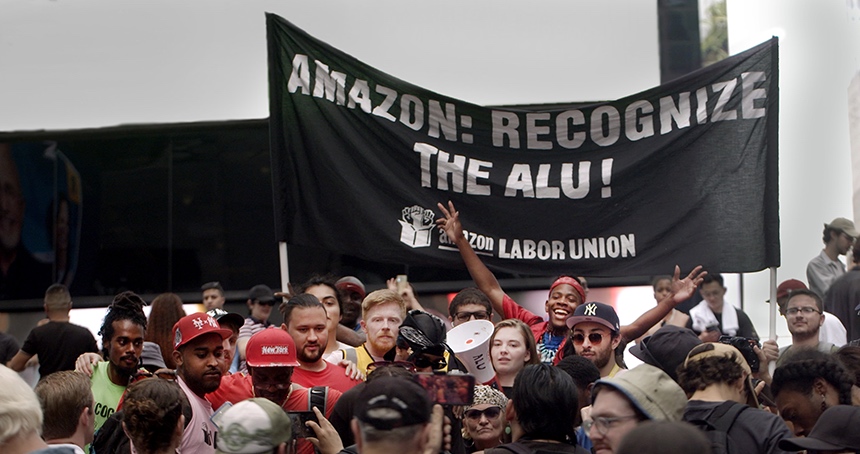DOC NYC 2024 Review: UNION, A Film That Won't Be Streaming on Amazon
In a world of plutocracy, the working-class struggle is not a left or right issue.

It's amazing how the words "the essential workers" left our collective consciousness already, after 1.2 million died of Covid related illness in the US, only a couple of years back. Now we are back to normal, being apathetic to our e-commerce-based economy, where delivery people, warehouse workers, and Uber drivers, among many others, are not treated like heroes anymore.
That said, it is quite clear after this year's Presidential Election that the majority of the US population voted for Trump out of economic anxiety, rather than any other issues. For the last four years, we were told, the economy was getting better. But for us working stiffs, it did not feel that way.
Cost of living is way too expensive for most of us, while meager wage increases couldn't keep up with the inflation. For democrats, who had been counting on anti-Trump sentiments alone, and shunned progressive working-class voices within the party, the landslide defeat was a sobering wake up call. It's not likely, though, that they would learn anything from their mistakes, just as they didn't in 2016, and again in 2022.
As we are facing a grim future for the next four years, Brett Story and Stephen Maing's new documentary, Union, should resonate more than ever. But you won't see the film streaming on Amazon any time soon.
Union tells the story about ALU (Amazon Labor Union) which made headlines in 2022 by organizing and winning the right to unionize a Staten Island Amazon Fulfillment Center. It's truly a Samson and Goliath story.
Amazon, one of the richest and most powerful online retail companies, which has 1.3 million workers nationwide, aggressively cracked down on unionizing workers who were asking for better working conditions, after many workers died during the Covid pandemic while working long hours on the floor with inadequate PPE. Chris Smalls, a former Fulfillment Center employee who was unjustly fired, became the point person, as he started organizing in a grassroots, face to face style, to have a worker's union, in and outside the facility for 11 months.
To have a union and have an election to do so in a workplace, you have to get 30 percent of the workforce to sign a petition and deliver it to NLRB (National Labor Relations Board). For the Amazon workers, just like any other heavy-turnaround e-job workers, it's an uphill battle all along the way because ALU is an extremely small and regional union (one Amazon facility among four in New York alone), no other established union would throw their support (Teamsters finally did only AFTER ALU won, of course), and even NLRB not giving a damn. There were infighting among factions: old school patriarch issues, disagreeing on abrasive tactics, class differences, all while Amazon deliberately oppressed their efforts to unionize.
Documentary veterans Story and Maing let the movement play out their efforts instead of narrating. They include several video footage of the internal Amazon meetings by the workers with their phones: in it, Amazon brought in outside consultant to discourage any kind of union activities with age-old, turn of the century talking points: the union takes dues no matter you are in it or not, which will go into the union bosses' pockets; even if you have a union, there's no guarantee that their conditions will improve, and so on. They plaster anti-union signs in breakrooms, even above the urinals.
NLRB decides that the petition for unionization is invalid because not all petitioners are currently Amazon employees. And this is the reality of the e-commerce economy. These gig jobs are not meant to be permanent. That means a company doesn't have any obligations to pay benefits.
But these are the most prevalent jobs for unskilled workers nowadays, and they are fast becoming permanent for most working class people, with no job security. The whole US economy is built on that, and companies like Amazon are still trying to cut corners any way they can for profit.
What Smalls and company are advocating is pretty obvious and simple: higher wages, workplace safety and job security. With day in, day out canvassing, they win the election to have a union. It is a small miracle. And there were some serious labor victories nationwide recently.
However, their fight is ongoing as the film shows: the second Staten Island Amazon facility failed to unionize. But the seed is planted, and the Amazon union momentum is spreading across the US. Union shows us that there is a glimmer of hope in the darkness.
I wonder as I watch Union: if only someone can tap into a worker solidarity, and speak plainly about the worker's rights in the state of our economy run by multi-million-dollar companies. With all the personal deficiencies, Smalls knew how to cut through all the bullshit that comes with organizing and actually get to people.
In a world of plutocracy, the working-class struggle is not a left or right issue. Smalls didn't care about whether he gets Biden's endorsement (again, he did AFTER they won). I wish he or someone from his organizing committee would run for office in the near future.
The film screens this week at DOC NYC. Visit their site for more information. It is also screening at Leeds International Film Festival, IDFA Film Festival, and Indie Memphis.
Dustin Chang is a freelance writer. His musings and opnions on everything cinema and beyond can be found at www.dustinchang.com







